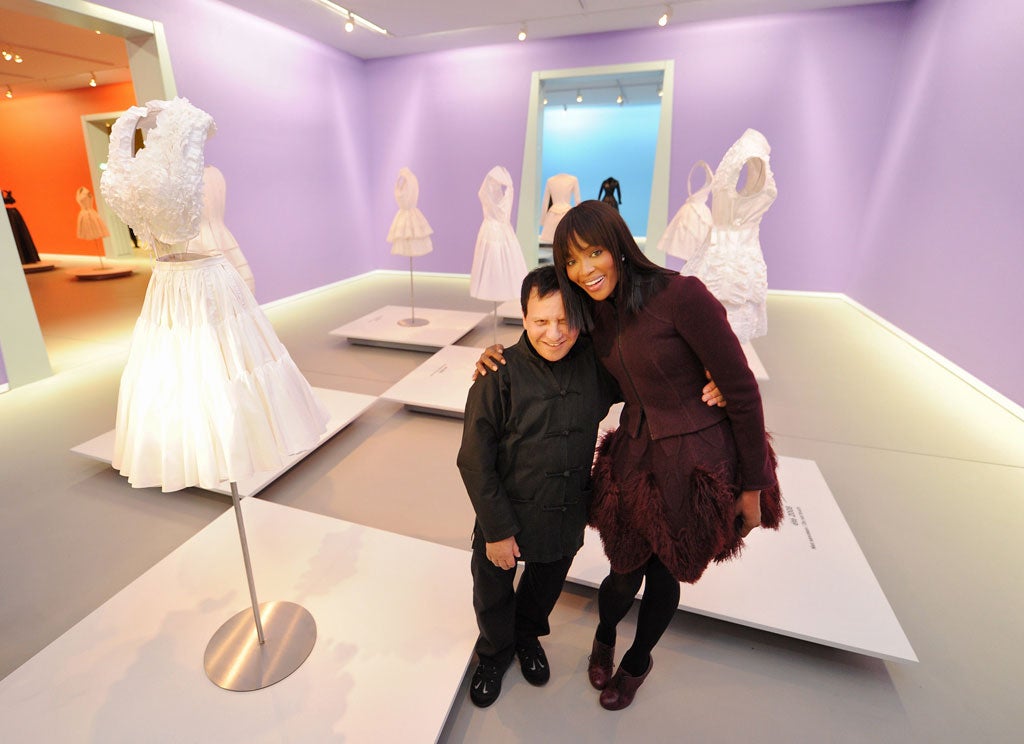Ten people who changed the world: Azzedine Alaia, a furious fashion talent
Whether in the cut-throat field of politics or the fashion industry's corridors of power, this year they left our planet a better place. Celebrate 10 of the best, nominated by Independent writers

Call it l'air du temps – or, indeed, fashion on the verge of a nervous breakdown. Whatever, 2011 will go down in history as a time when this generally polite industry lost its collective rag.
It all began with John Galliano accused of racism and anti-Semitism (he has since been found guilty of both) following an uncharacteristically loose-lipped outburst in a Paris café at the end of February. Natalie Portman – also atypically outspoken on this occasion – swiftly announced herself "deeply shocked and disgusted". So did Karl Lagerfeld: "I'm furious, if you want to know".
Also furious this year was Patrick Thomas, the famously discreet CEO of Hermès. On 6 March, after learning that Bernard Arnault, president of rival fashion corporation LVMH, had acquired a 20 per cent stake of his company, Thomas accused him of "rape". "If you want to seduce a beautiful woman," Thomas said of a move that insiders saw as the first step towards a hostile takeover, "you do not start by raping her from behind".
Moving swiftly on to April, and Christian Louboutin's no less angry attempt to force Yves Saint Laurent to withdraw a pair of red-soled shoes from its stores on the grounds, according to the footwear designer's lawyers, that "Louboutin is the first designer to develop the idea of having red soles on women's shoes". YSL's lawyers responded with appropriate – not to mention inflammatory – hauteur, stating: "Red outsoles are a commonly used ornamental design feature in footwear, dating as far back as the red shoes worn by King Louis XIV in the 1600s...". In August, Louboutin's injunction was denied when Judge Victor Marrero compared the case to a hypothetical one where Picasso might sue Monet for using the colour blue. Ouch.
Leave it to Azzedine Alaïa, however, to take a fashion spat and inflate it into unprecedented proportions, putting all others in the shade. First, the 71-year-old designer turned his attention to Karl Lagerfeld. Alaïa told French online magazine Virgine in June: "I don't like his fashion, his spirit, his attitude. It's too much caricature. Karl Lagerfeld never touched a pair of scissors in his life."
And here he is on Anna Wintour: "She runs the business very well, but not the fashion side. When I see how she is dressed, I don't believe in her tastes one second. Anyway, who will remember Anna Wintour in the history of fashion? No one."
Basking in the knowledge that, more than any other designer, he occupies neutral territory – it is not uncommon for M Alaïa to be seen front row at many of his competitors' shows, or indeed for other designers to wear his clothes – this is not a man who has been overly worried about what others might think of him and that, too, in fashion circles, is most unusual.
His designs are as exclusive today as they were 30 years ago, as seen at a current exhibition at the Groningen Museum in The Netherlands (on show until 6 May). Any buyer is still grateful to receive his pieces, however late in the season they may arrive (they're usually pretty late). Tunisian-born Alaïa is so grand that he turned down the Légion d'honneur. "You know, Sarkozy offered [it]," he said in July. "I refused. People said I refused because I don't like Sarkozy, but that's ridiculous. I refused because I don't like decorations – except on women."
And so it was with some fanfare that, after an absence from the catwalk of eight years, in July the designer chose to show to the most intimate coterie of journalists and friends imaginable during the autumn/winter haute couture season in Paris. Donatella Versace was there. So, too, was Kanye West (in October, Alaïa returned that particular favour, attending West's debut ready-to-wear show). Then came the beautiful Sofia Coppola who was in search of a wedding gown. At the end of the summer – on 29 August, to be precise – she married Thomas Mars in the tiny Italian town of Bernalda – where her great-grandfather was born and her famous father still owns a palazzo – in a delicately worked, light-as-a-feather lavender dress made for her by Azzedine Alaïa.
Join our commenting forum
Join thought-provoking conversations, follow other Independent readers and see their replies
Comments
Bookmark popover
Removed from bookmarks